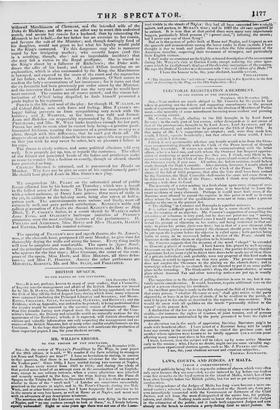ELECTORAL REGISTRATION AMENDMENT.
TO THE EDITOR or THE SPECTATOR.
Wrexham, Wit December 1833.
Sin—Your readers are much obliged to Mr. COOPER for the pains he has taken in pointing out the defects and suggesting amendments in the present mode of registering persons entitled to vote in the election of Members of Parlia- ment,—the necessity of some amendment becoming more evident and pressing every revising circuit. 31r. Cooreit, though alluding to the Bill brought in by Lord Jenne. RUSSEL!. in the early part of last session, either disregards or is not aware of that of the previous one, brought in by Lord JOHN, Lord ALTOOR r, and the Attorney-General, and ordered to be printed on the Ilth of June 11534. In this many of Mr. C.'s suggestions are adopted • and, were they made law, would, I think, operate beneficially ; but that Others of them would, I have doubt., which I will state.
1 think it very questionable whether any benefit would mine from the Over- seers communicating directly with the Clerk of the Peace instead of through the High Constable. If emirs are made in Communicating with the latter officer, who is a local one, and with whom the Overseer has frequent opportu- nities of conferring at petit sessions, &v. they are, I think, very likely to in- crease in sending to the Clerk of the Peace, a general and central officer' whom the Overseer rarely if ever sees. All orders, Fee, before revision, would behest made through the High Constable. After revision, however, I would admit of no third tewtv between the Barrister and the Clerk of the Peace. The 10th clause of the bill of 1804 proposes, that after the lists shall have been revised by the Barrister, the High Constable shall receive the same and enlist them to be delivered to the Clerk of the Peace ; which I think very objectionable, opening a wide door to fraud.
The necessity of a voter sending in a fresh claim upon every change of resi- dence operates very hardly. At the same time, it is beneficial to know the exact residence of every claimant. Perhaps it would meet both eases, if the Barrister were allowed to amend the register in this point as well as in every other where the merits of the qualification were not at issue, under a proviso similar to the one in the present Act. " The shilling " in Counties and Boroughs is a perfect nuisance.
It is rather a difficult point to decide how far a voter should be protected frean the scrutiny of an objector. Mr. COOPF. it's suggestion of compelling the ttendative of witnesses is very good, but lie does not point ant any " moving power." In the ease of a registered voter I would compel an objeetor, having stated the ground of objection in his notice, and being restricted to that one only, to prove his prima fiicie case first ; but in that of a new claimant (the objector having given a similar notice) the claimant should prove his right to be put upon the register before the objector is called upon ; both parties being liable to costs, to be recovered before a Justice of the Peace, should the Barrister decide either claim or objection to be frivolous.
31r. Coortat suggests that the meaning of the word " chapel " Ire extended
to Dissenthg places of worship. I have known lists placed by well-meaning Overseers on such places indignantly torn down ; the parties declaring thafthe Legislature had no more right to direct their doors to be mule use of than those of a private individual ; and, probably, were any proposal of this kind made in the House, it would be opposed on that very point. The present enactment does not confine the Overseers to the placing on the church- done ; and in townships where there is no church they are directed to put it on smite public place in the township. The blacksmith's shop, the alehouse-shutter, or some place where Assessed Tax and other township notices are put up, is usually selected.
The suggestion as to the choice of polling-districts is new to me, but it cer- tainly merits consideration. It would, however, require additional care on the part of a person changing his residence.
An excellent provision is made in the 6th clause of the Bill of 1834, requiring
that every person, c whether Overseer or not," shall give notice to the party objected to, or leave it at his place of abode, if he be resident in the parish, or send it by post to his abode as described in the register, if non-resident. This would do away with all quibbles on the words "personally deliver to the tenant" in the present Act.
A declaration of the law as to the right of voting in many cases would be de- sirable,—for instance, the rights of trustees, of tenants, and of persons in adverse possession undisturbed by the party presumed to have the right of possession. Au alteration too in the mode of appointing Revising Barrister" might be made with beneficial effect. I have heard of a Barrister being told he might have any county in the circuit but the one he visited the previous year, and another whose opinions were known to be totally opposite (on a certain point affecting many votes) sent there in his stead.
I trust, however, that the subject will be taken up by some active Member early in the session ; who, I have no doubt, might receive some saluahle sug- gestions front experienced election agents, such as Mr. J. PA RKEs and others. I au), Sir, your obedient servant and constant subscriber,
THOMAS EnnIvonT11.


























 Previous page
Previous page